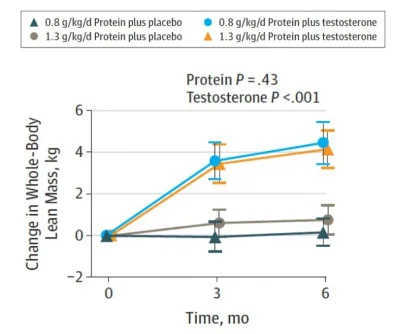The study was a 2 x 2 factorial design where older men were given 100 mg of testosterone a week or not and were eating 1.3 g/kg or 0.8 g/kg (the RDA) of protein a day. No mention is made in the summary of any exercise program, but the summary says the men were "functionally limited." The men were followed for 6 months. As you can see from the graph, testosterone significantly increased lean body mass, but there was no benefit from additional protein.

The summary can be read online. The full article is behind a paywall.
This randomized clinical trial with a 2 × 2 factorial design was conducted in a research center. A modified intent-to-treat analytic strategy was used. Participants were 92 functionally limited men 65 years or older with usual protein intake less thanor equal to 0.83 g/kg/d within the RDA. The first participant was randomized on September 21, 2011, and the last participant completed the study on January 19, 2017.
Participants were randomized for 6 months to controlled diets with 0.8 g/kg/d of protein plus placebo, 1.3 g/kg/d of protein plus placebo, 0.8 g/kg/d of protein plus testosterone enanthate (100 mg weekly), or 1.3 g/kg/d of protein plus testosterone. Prespecified energy and protein contents were provided through custom-prepared meals and supplements.
Among 92 men the 4 study groups did not differ in baseline characteristics. Changes from baseline in lean mass, as well as muscle strength and power, walking speed and stair-climbing power, health-related quality of life, fatigue, and well-being, did not differ between men assigned to 0.8 vs 1.3 g/kg/d of protein regardless of whether they received testosterone or placebo. Fat mass decreased in participants given higher protein but did not change in those given the RDA: between-group differences were significant.

The summary can be read online. The full article is behind a paywall.














